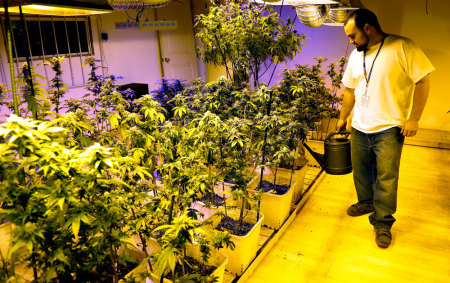Indiana's Marijuana Church Granted Tax-Exempt Status; Plans to Test Limits of Controversial Religious Freedom Law at First 'Worship' Service

Indiana's marijuana-smoking church has been incorporated as a tax-exempt religious organization by the Internal Revenue Service, according to the church's founder.
Bill Levin, the founder of the First Church of Cannabis, a controversial group looking to test the limits of Indiana's new Religious Freedom Restoration Act by indulging in the smoking of marijuana during "church" services, said the IRS notified him earlier this week that the group's tax-exempt status will allow donors to deduct their contributions.
"It means people in higher tax brackets will be more generous with the church," said Levin to News and Tribune. "There have been people who want us to succeed but they've [been] waiting [on] our 501c3 exemption."
The organization was established by Levin in March, after Indiana's General Assembly passed the controversial Religious Freedom Restoration Act which will go into effect on July 1.
The Religious Freedom Restoration Act says the government cannot "substantially burden" a person's ability to follow their religious beliefs, unless it can prove a compelling interest in imposing that burden and it does so in the least restrictive way.
The First Church of Cannabis hopes to test the new law by holding a service on July 1 where members will take part in recreational marijuana-smoking, an activity that is illegal in the state of Indiana.
Levin recently revealed his plans for the service during an interview with U.S. News.
"I'm an old school producer," Levin told U.S. News. "We start off the show soft and we have a build-up and then in the end we explode in glory and we all dance around the hall."
Levin said the service will open with "Amazing Grace" being played on a harmonica by a popular young musician and will move to a quick sermon followed by a "call to worship," which is a time for members to smoke.
The organization is currently looking for a church that will lease them space for the event. However, it's still unclear if local police and prosecutors are prepared to accept recreational marijuana smoking as protected under RFRA.
Peg McLeish, a spokeswoman for the Marion County Prosecutor's Office in Indiana previously told U.S. News that RFRA doesn't necessarily protect people committing crimes from being arrested.
"It's that they could assert [their religious beliefs are] a defense if they are prosecuted," she said.
Levin, however, is not worried about authorities interrupting the service.
"I don't think they're going to come into the church and arrest us," Levin said. "They don't go into a church now and stop people under 21 from drinking sacramental wine that's part of a service."
And although Levin appears to be taking advantage of RFRA, those in the LGBT community saw it as a way for Christian businesses to refuse to service gay weddings based on their beliefs when Indiana's Republican Gov. Mike Pence first signed it into law in March.
To appease detractors, Pence signed revisions into the law to remove fears that it would allow businesses to discriminate against the LBGT community in April.





















